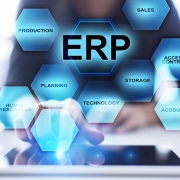Best Cloud ERP Software Of 2024 – Benefits and How to Choose the Best One
Enterprise resource planning (ERP) software has quickly gone from on-premise environments to the cloud being the most popular option. Being on the cloud means your ERP will be hosted online – meaning greater accessibility and reach to your team. Amy Nichol Smith, tech expert and writer, and Kelly Main, marketing editor and writer, wrote an article on Forbes highlighting this years best cloud ERP software on the market and how they can benefit your business almost immediately.
The Best 7 Cloud ERP Software of 2024
- Microsoft Dynamics 365 Business Central: Best overall
- SAP Business One Professional: Best for customization
- SYSPRO: Best for manufacturing businesses
- QT9: Best for real-time reporting
- Epicor Prophet 21 ERP: Best for distributors
- Oracle NetSuite OneWorld: Best for global companies
- Acumatica: Best for easy pricing
Benefits of Choosing a Cloud ERP
There are many benefits of choosing to move to a cloud ERP over traditional on-premise applications. For one, the ease of accessibility with cloud-based ERPs is a great advantage for on the go employees or those who work remotely. Additional benefits, according to the Forbes article, include:
- Low upfront investment: With the platform and data hosted on the provider’s servers, you don’t need to purchase hardware for the software
- Less expensive: Paying a monthly per-user fee may be much easier on budgets of small enterprises, so it can be affordable to use cloud ERP software.
- No maintenance: You won’t need your IT department to dedicate resources to updating or maintaining your software because the provider should handle it for you.
- Consolidated data: All the data you need to see across departments should sync seamlessly, so you can see real-time analytics on financials, materials, processes, time restraints, expected availability of goods and other important data.
- Fewer integrations: Most cloud ERP software is fairly complete, so you shouldn’t need to subscribe to multiple SaaS to handle business operations.
- Mobile access: You can access your platform wherever you are from a tablet, smartphone or laptop, making it much easier and faster to work with clients, provide quotes and log orders without having to rekey information back at the office.
- Highly scalable: Cloud ERP software typically charges companies a monthly fee based on how many users they have, so it’s much easier to scale the software with your company.
- Easy to get started: Rather than creating a business operations solution piecemeal, as many startups do in the beginning, small businesses can take advantage of the low cost of entry of cloud ERP software to get started with ERP from the get-go.
- Reduce paper trails: You can track purchase orders, invoices and receipts all from a single cloud ERP app, so you don’t have to input data later.
How To Choose the Best Cloud ERP Software
Not all ERP software are the same, and not all will have the bells and whistles needed for your business, industry and/or product. Some offer better customizations, others offer more real-time reporting, and of course some will be better for your budget than others. Below are what Forbes advisors suggest as must-have features and the key factors for a cloud ERP.
- Real-time analytics: One of the most useful features of cloud ERP software is the real-time reporting most include. You can view your data in different ways using many variables to help you make informed business decisions.
- Automatic syncing: The main benefit of cloud ERP software is the ability to use it anywhere you are (as long as you have an internet connection), so automatic syncing of data is also important for every user. This helps ensure you have accurate information every time you use the app.
- Inventory management: Almost all cloud ERP software includes inventory management, but some get granular and include kitting and bills of materials, which is vital for manufacturing and distribution companies.
- Accounting: The majority of cloud ERP software centers its platform on the financial side of things. You can expect basic accounting features (general ledger, accounts receivable and payable, reconciliations, etc.), but some get more advanced. Most also include the ability to issue quotes, invoices and accept payments and pay bills (and payroll).
- Automation: The best cloud ERP software includes automated workflows, so you can set up actions based on triggers to run payroll, create invoices or send reports, for example, automatically. This is a big part of how cloud ERP software is used to increase a company’s productivity.
- Integrations: Many small and midsize enterprises still rely on other apps to help manage their businesses, so it’s important to find out which apps a cloud ERP software supports.
- Supply chain management: There are a variety of features you can find within supply chain management, including purchase and work orders, order transfers and demand and supply planning.
- CRM: Even if it’s basic CRM features, most cloud ERP software include ways for you to manage contacts, see client profiles and take notes within them.
In addition to ERP cloud features, consider also the following: Cloud ERP Software Specialization, Ease of Use and Implementation, Support, Price, and Integrations.




Leave a Reply
Want to join the discussion?Feel free to contribute!